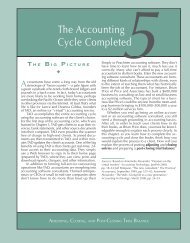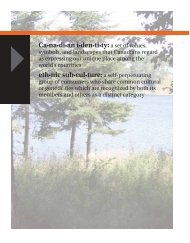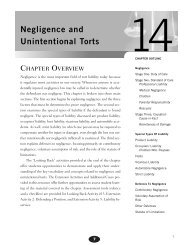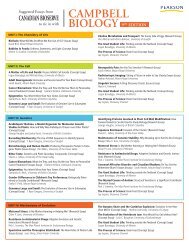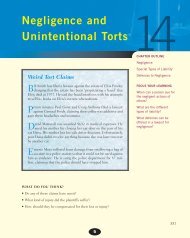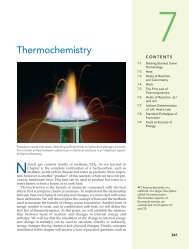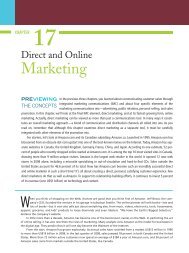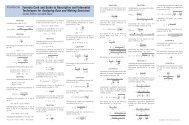PART Introduction to Cultural Anthropology - Pearson Canada
PART Introduction to Cultural Anthropology - Pearson Canada
PART Introduction to Cultural Anthropology - Pearson Canada
Create successful ePaper yourself
Turn your PDF publications into a flip-book with our unique Google optimized e-Paper software.
KEY CONCEPTS<br />
agency, p. 14<br />
anthropology, p. 4<br />
applied anthropology, p. 4<br />
archaeology, p. 4<br />
biological anthropology,<br />
p. 4<br />
biological determinism,<br />
p. 26<br />
class, p. 19<br />
cultural anthropology, p. 4<br />
cultural constructionism,<br />
p. 27<br />
cultural materialism,<br />
p. 13<br />
cultural relativism,<br />
p. 11<br />
culture, p. 4<br />
ethnicity, p. 21<br />
ethnocentrism, p. 25<br />
ethnography, p. 24<br />
ethnology, p. 24<br />
functionalism, p. 11<br />
gender, p. 21<br />
globalization, p. 19<br />
holism, p. 11<br />
indigenous peoples, p. 21<br />
interpretive anthropology,<br />
p. 13<br />
linguistic anthropology,<br />
p. 4<br />
local culture, p. 14<br />
localization, p. 19<br />
race, p. 21<br />
structurism, p. 14<br />
symbol, p. 17<br />
To reinforce your understanding of<br />
this chapter, and <strong>to</strong> identify<br />
<strong>to</strong>pics for further study,<br />
visit MyAnthroLab at<br />
www.pearsoned.com/myanthrolab<br />
for diagnostic tests and a<br />
multimedia ebook.<br />
SUGGESTED READINGS<br />
William I. Adams, The Philosophical Roots of <strong>Anthropology</strong>.<br />
Stanford, CA: CSLI Publications, 1998. Adams considers five<br />
ideas as roots of North American anthropology: progressivism,<br />
primitivism, natural law, Indianology (the study of First Nations),<br />
and German idealism. These ideas help explain why North<br />
American anthropology, compared with British anthropology,<br />
for example, retained the four-field structure.<br />
Thomas J. Barfield, ed. The Dictionary of <strong>Anthropology</strong>. Malden,<br />
MA: Blackwell Publishing, 1997. This reference work contains<br />
hundreds of brief essays on concepts in anthropology, such as<br />
evolution, myth, functionalism, and applied anthropology, and<br />
on important anthropologists.<br />
Stanley Barrett, <strong>Anthropology</strong>: A Student’s Guide <strong>to</strong> Theory and<br />
Method. Toron<strong>to</strong>: University of Toron<strong>to</strong> Press, 1996. This helpful<br />
handbook for undergraduate anthropology students provides a<br />
useful overview of the development of the discipline, and links<br />
methods <strong>to</strong> past and present theories.<br />
Merryl Wyn Davies and Piero (illus.), Introducing <strong>Anthropology</strong>.<br />
Cambridge, UK: Icon Books, 2002. This book offers snappy<br />
insights on key thinkers, developments, and arguments in anthropology.<br />
Each page is illustrated with car<strong>to</strong>on-like drawings that<br />
make for lively reading.<br />
Marvin Harris, Our Kind: Who We Are, Where We Came From and<br />
Where We Are Going. New York: HarperCollins, 1989. This<br />
book contains 100 thought-provoking essays on <strong>to</strong>pics in general<br />
anthropology’s four fields, including early human evolution, <strong>to</strong>ol<br />
making, Neanderthals, food preferences, sex, sexism, politics,<br />
animal sacrifice, and thoughts on the survival of humanity.<br />
F. Manning, ed., Consciousness and Inquiry: Ethnology and Canadian<br />
Realities. Ottawa: National Museum of Man, 1983. CES paper<br />
89e. In this edited volume, eminent Canadian anthropologists<br />
present overviews or his<strong>to</strong>rical perspectives on their areas of<br />
specialization, including applied anthropology in <strong>Canada</strong>.<br />
R. Bruce Morrison and C. Roderick Wilson, eds. Native Peoples: The<br />
Canadian Experience, 3rd ed. Toron<strong>to</strong>: Oxford University Press,<br />
2004. This sourcebook on northern peoples contains 26 chapters<br />
with sections divided by region. Chapters about various cultural<br />
groups provide his<strong>to</strong>rical context and updates on the current<br />
situation.<br />
Pearl T. Robinson and Elliott P. Skinner, eds., Transformation<br />
and Resiliency in Africa: As Seen by Afro-American Scholars.<br />
Washing<strong>to</strong>n, DC: Howard University Press, 1983. Framed by an<br />
introduc<strong>to</strong>ry essay on black scholarship on Africa and a conclusion<br />
that looks <strong>to</strong>ward the future, nine chapters explore different<br />
areas of African culture, including labour migration in Kenya,<br />
politics and government in Nigeria, religion in the Ivory Coast,<br />
religion and popular art in urban Africa, and the transformation<br />
of African music.<br />
George W. S<strong>to</strong>cking, Jr., The Ethnographer’s Magic and Other Essays<br />
in the His<strong>to</strong>ry of <strong>Anthropology</strong>. Madison, WI: University of<br />
Wisconsin Press, 1992. The author provides a detailed examination<br />
of the emergence of cultural anthropology from Tylor<br />
through Boas and Mead, with a summary chapter on major<br />
paradigms in the his<strong>to</strong>ry of general anthropology.<br />
Eric R. Wolf, Europe and the People without His<strong>to</strong>ry. Berkeley, CA:<br />
University of California Press, 1982. In this book, Wolf examines<br />
the impact since 1492 of European colonial expansion on the<br />
indigenous cultures with which they came in<strong>to</strong> contact. He also<br />
traces various phases of trade relationships, including the slave<br />
trade and goods such as fur and <strong>to</strong>bacco, and the emergence of<br />
capitalism and its effects on the movement of people and goods<br />
between cultures.<br />
CHAPTER 1 ■ <strong>Anthropology</strong> and the Study of Culture 31



